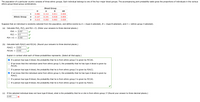
A First Course in Probability (10th Edition)
10th Edition
ISBN: 9780134753119
Author: Sheldon Ross
Publisher: PEARSON
expand_more
expand_more
format_list_bulleted
Question
part c

Transcribed Image Text:The population of a particular country consists of three ethnic groups. Each individual belongs to one of the four major blood groups. The accompanying joint probability table gives the proportions of individuals in the various
ethnic group-blood group combinations.
Blood Group
A
В
AB
1
0.082
0.114
0.011
0.004
Ethnic Group
2
0.127
0.141
0.018
0.003
0.215
0.202
0.063
0.020
Suppose that an individual is randomly selected from the population, and define events by A = {type A selected}, B = {type B selected}, and C = {ethnic group 3 selected}.
(a) Calculate P(A), P(C), and P(A n C). (Enter your answers to three decimal places.)
P(A)
0.457
P(C) =
0.5
P(A n C) =
0.202
(b) Calculate both P(A|C) and P(C|A). (Round your answers to three decimal places.)
P(A|C) =
0.404
P(C|A)
0.442
Explain in context what each of these probabilities represents. (Select all that apply.)
V If a person has type A blood, the probability that he is from ethnic group 3 is given by P(C|A).
If we know that the individual came from ethnic group 3, the probability that he has type A blood is given by
P(C|A).
O If a person has type A blood, the probability that he is from ethnic group 3 is given by P(A|C).
V If we know that the individual came from ethnic group 3, the probability that he has type A blood is given by
P(A|C).
O If a person has type B blood, the probability that he is from ethnic group 3 is given by P(C|A).
If a person has type B blood, the probability that he is from ethnic group 3 is given by P(A|C).
(c) If the selected individual does not have type B blood, what is the probability that he or she is from ethnic group 1? (Round your answer to three decimal places.)
0.481
O O
Expert Solution
This question has been solved!
Explore an expertly crafted, step-by-step solution for a thorough understanding of key concepts.
This is a popular solution
Trending nowThis is a popular solution!
Step by stepSolved in 2 steps

Knowledge Booster
Learn more about
Need a deep-dive on the concept behind this application? Look no further. Learn more about this topic, probability and related others by exploring similar questions and additional content below.Similar questions
arrow_back_ios
arrow_forward_ios
Recommended textbooks for you
 A First Course in Probability (10th Edition)ProbabilityISBN:9780134753119Author:Sheldon RossPublisher:PEARSON
A First Course in Probability (10th Edition)ProbabilityISBN:9780134753119Author:Sheldon RossPublisher:PEARSON

A First Course in Probability (10th Edition)
Probability
ISBN:9780134753119
Author:Sheldon Ross
Publisher:PEARSON
